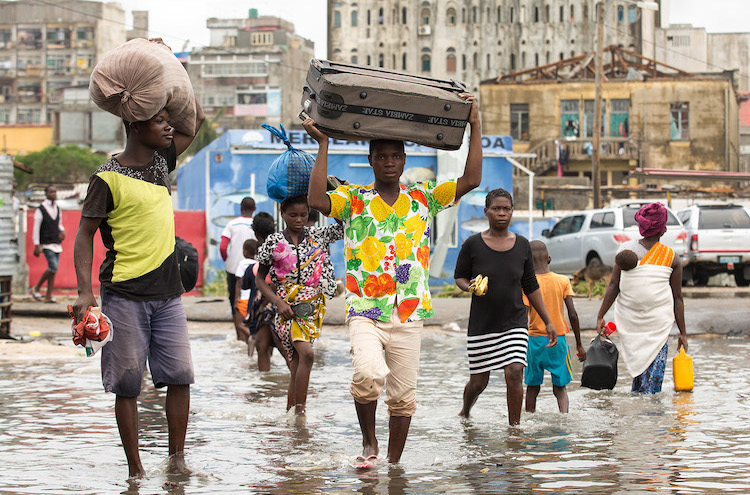By Lisa Vives, Global Information Network
NEW YORK | 5 December 2023 (IDN) — Diplomats from nearly 200 countries celebrated with cheers and applause at the opening of the UN Climate Conference in Dubai, where a disaster fund to help vulnerable nations cope with the impact of drought, floods and rising seawater was announced.
The long-awaited “loss and damage” fund was signed, sealed and delivered at record speed on the first day of the global warming conference.
The draft resolution is the culmination of a 30-year effort by low- and middle-income countries to be compensated by high-income countries for the harm done by the effects of climate change.
Sultan Al Jaber, conference host and CEO of ADNOC, the United Arab Emirates oil company, called the fund a “significant milestone”, and gave thanks to oil companies “who have stepped up to join this game-changing journey”.
“This will be a critical year in a critical decade for climate action,” he was quoted to say. “The UAE is approaching this year’s conference with a strong sense of responsibility and the highest possible level of ambition.
Initial pledges for “loss and damage” totalled about US$420 million according to Nature magazine with initial pledges of US$245 million from the EU including US$109 million from Germany, US$100 million from the UAE, US$51 million from the UK, US$10 million from Japan and US$17.5 million from the US—an amount criticized by some activists as too low for the world’s largest economy and biggest historic source of greenhouse gases.
Researchers and campaigners welcomed the move, while recognizing that much more is needed and that pledges are not the same as money in the bank.
“The initial funding pledges are clearly inadequate,” declared Mohamed Adow, Kenyan director of Power Shift Africa. “In particular, the amount announced by the US is embarrassing.”
UN estimates
A recent UN report estimates up to $387 billion is needed annually for developing countries to adapt to climate-driven changes.
The fund will be temporarily housed at the World Bank. Climate-vulnerable countries initially opposed the idea because the US appoints the Bank’s president and the Bank has limited experience in climate finance, mostly disbursing loans.
Joyce Banda, former president of Malawi, was among those who praised the new fund, calling it “a big win for vulnerable countries, especially those in Africa that contributed little to the climate crisis. It’s a step in the right direction for countries like Malawi that have suffered extreme losses due to cyclones that killed more than 500 and displaced half a million others just this year.”
But “while we welcome the pledges from rich nations, we need clear directions on how the most vulnerable communities can benefit… The fund must not lock countries into more debts… We need action and less statements of intent.”
Mike Terungwa, head of the Global Initiative for Food Security & Ecosystem Preservation in Nigeria added: “The pledges sound good but they are political statements and not REAL money. It would be great if specific time frames could be included for many of the pledges that were made 8 years ago at the Paris Agreement. The pledges should not turn into emission or pollution permits from the countries pledging.”
Mithika Mwenda, head of the Pan African Climate Justice Alliance added another note of caution: “We’ve a long way to see this fund functional, though we celebrate the small steps made by the adoption of the report.
“We caution our leaders not to be blinded by the announcement of $400 million, as we need massive responses for loss and damage, as well as adaptation and resilience building by the people at the frontline of climate crisis.”
A recent US$3 billion pledge by the US, announced by Vice President Kamala Harris, was earmarked for the Green Climate Fund and differs from loss and damage in that GCF funds involve debt, guarantees and other private investment schemes. Investors include Mark Zuckerberg, BlackRock, Tencent, and Silver Lake, among others.
The UN Secretary-General added his voice for urgency. “We cannot save a burning planet with a fire hose of fossil fuels,” he maintained. “(This) is only possible if we stop burning all fossil fuels. Not reduce. Not abate.”
“I urge governments to help industry make the right choice—by regulating, legislating, putting a fair price on carbon, ending fossil fuel subsidies, and adopting a windfall tax on profits.”
The key test now is whether the fund can get the money to the places it is needed fast. The agreement is a really important signal, said Tom Mitchell, head of the London-based International Institute for Environment and Development. “Now the hard work starts with actually getting it to work and getting the money to the front line of climate impacts.” [IDN-InDepthNews]
Photo: The aftermath of Cyclone Idai which stuck Mozambique in March 2019. Image Credit: Denis Onyodi, IFRC/DRK/Climate Centre, licensed under a CC BY-NC 2.0 DEED license.












